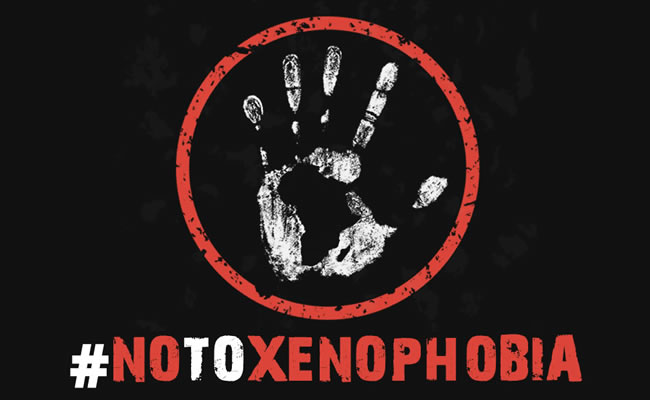Recognising that South Africa has experienced xenophobic violence on numerous occasions on a scale which has been unprecedented in its democratic history, South Africa needs to recognise and strengthen those policies and laws which will promote tolerance and cater for appropriate sanctions for perpetrators of xenophobia. The last years have seen frequent attacks against refugees and migrants living in South Africa. We are reminded that between 2000 and 2008 close to 67 people died due to what became identified as xenophobic attacks in South Africa.[1] In May 2008, 62 people were killed and 600 sustained injuries as a result of xenophobic attacks.[2]Twenty-five of those killed were South Africans who were mistakenly believed to be non-nationals. Since 2009, the number of attacks against refugees and migrants in South Africa escalated reaching an average of between two and three attacks annually. In April 2015 at least 5 people died and about 5000 others were displaced when there was an outbreak of xenophobic attacks in the KwaZulu Natal province. During the 2015 attacks, at least 5 people were killed. Last week foreign nationals in Pretoria faced another wave of violent attacks. As in the past, these attacks caused loss of lives, injury, loss of livelihood and irreparable damage to property.
In 2015, more than 100 civil society organisations (CSOs) and concerned members of the public addressed a letter to the African Commission on Human and Peoples’ Rights (African Commission) asking the Commission to impress on the government of South Africa to take measures to curb the problem. The point was made clear in the letter by CSOs that nothing is more scary for foreign nationals than living in a society rooted in such violent practices, where there is no respect or tolerance for people from other countries. Often, refugees and migrants living in societies where violence against them is not adequately prevented or responded to live in fear as they face gross violations of their fundamental rights. In addition to the loss of life, the ultimate effect of xenophobia is an increased sense of vulnerability and fear among the affected population. Hate crimes are violent manifestations of intolerance and have a deep impact not only on the immediate victim, but the group with which victims identify themselves. They affect community cohesion and social stability. A vigorous response is, therefore, important both for individual and communal security.
In 2015, in response to the civil society joint letter, the African Commission issued a Resolution calling upon the government of South Africa to take the necessary measures to ensure that the rights of all migrants are protected in accordance with the applicable international and regional human rights instruments. The Resolution also urged South African authorities to take all the necessary steps to stop the violence, investigate and punish the perpetrators of xenophobic attacks against non-nationals living in the country. In essence, these recommendations aimed to help curb the problem. The 2015 Resolution of the African Commission remains relevant to the current situation in South Africa. We call on the South African Government to implement all the provisions of the Resolution.
The recent attacks against non-nationals in Pretoria shows that much needs to be done in order to stop these deadly and persistent attacks against non-nationals. It is evident that further action needs to be taken to address xenophobia at the community level including by carrying out campaigns aimed to raise awareness and educate the public about the negative effects of xenophobia, protect potential victims and discourage people from indulging in such negative practices. We remind the South African Government of its international and domestic obligation to ensure that every individual enjoys their rights to life and dignity regardless of their ethnicity or migration status.
We, the undersigned, remain concerned about xenophobic attacks against non-nationals living in South Africa and call upon the government to do all in its powers to address this problem.
Signed jointly by the following organisations:
1. Southern Africa Litigation Centre, South Africa
2. The Zimbabwe Human Rights NGO Forum, Zimbabwe
3. Centre for Human Rights, University of Pretoria, South Africa
4. Human Rights Institute of South Africa, South Africa
5. The African Centre for Democracy and Human Rights Studies, Gambia
6. Human Rights Commission- Mozambican Bar Association, Mozambique
7. Associação para a Justiça Paz e Desenvolvimento, Angola
8. Zimbabwe Human Rights Association, Zimbabwe
9. Crisis in Zimbabwe Coalition, Zimbabwe
10. Southern African Christian Initiative, Namibia
11. Legal Assistance Centre, Namibia
12. Equality Now, Kenya
13. MBAKITA, Angola
14. Women and Law In Southern Africa Research and Education Trust
15. COSPE, Swaziland
16. MANGO Key Population NGO Network, Malawi
17. Maphunziro Foundation, Malawi
18. The Positive Men's Union (POMU), Kampala, Uganda
19. Institute for Human Rights and Development in Africa, Gambia
20. Initiative for Social and Economic Rights, Uganda
21. Centre for Youth Empowerment and Civic Education, Malawi
22. Africa Legal Aid , Netherlands
23. Caritas, Zambia
24. Pan African Positive Women's Coalition, Zimbabwe
25. Institute for Security Studies, South Africa
26. Association SCARJoV, Angola
27. Paralegal Alliance Network, Zambia
28. Paralegal Advisory Service Institute, Malawi
29. Gay & Lesbian Network, South Africa
30. Ladder for Rural Development, Malawi
31. Women and Law in Southern Africa, Mozambique
32. Zambia National Women's Lobby, Zambia
33. Human Rights First Rwanda Association, Rwanda
34. Namibia Women’s Health Network, Namibia
35. Sonke Gender Justice, South Africa
36. Action Contre l'Impunité pour les Droits Humains, Democratic Republic of Congo
37. Khulumani Support Group, South Africa
38. Centro dos Direitos Humanos da Universidade Eduardo Mondlane, Mozambique
39. AIDS and Rights Alliance for Southern Africa, Namibia
1. See CSOs open letter to the African Commission regarding xenophobic attacks in South Africa, available at http://www.southernafricalitigationcentre.org/2015/04/23/open-letter-to-the-african-commission-regarding-the-xenophobic-attacks-in-south-africa/, (accessed 23 February 2017).
2 As above.
3 Report on the SAHRC Investigation into Issues of Rule of Law, Justice and Impunity arising out of the 2008 Public Violence against Non-Nationals http://pmg-assets.s3-website-eu-west-1.amazonaws.com/docs/101124sahrcrep_0.pdf


